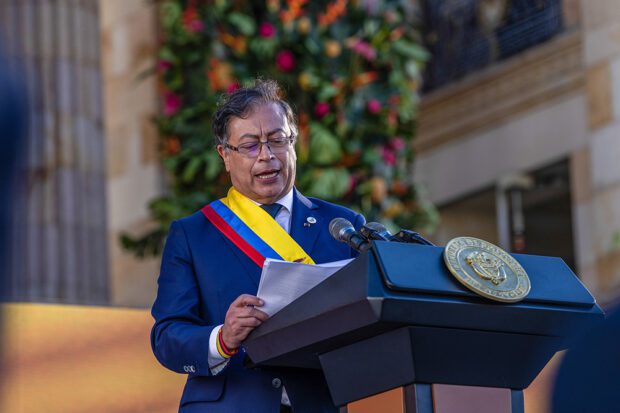
In May 2022, Colombia elected its first progressive center-left government with the ticket of Gustavo Petro and Francia Márquez, of the Historic Pact Party. This ended a long period of right-wing government and violence against the people in Colombia who worked for change—environmentalists, labor leaders, indigenous peoples rights activists, feminists.
The United States was more than complicit in that oppression and violence; U.S. interests were direct instigators and organizers of the killings. U.S. policy in Latin America was determined by large U.S. corporations to support corporate interests, particularly United Fruit (Chiquita Banana), which supported oppressive right-wing governments and paid for the killing of labor leaders and anyone else who might interfere with profits.
An obvious example was the U.S. government’s coup to overthrow democratically elected Guatemalan President Jacobo Árbenz in 1954, after Árbenz supported labor and land reforms. The U.S. Secretary of State in 1954 was John Foster Dulles, who had represented United Fruit as a corporate lawyer. His brother, Allen Dulles, ran the CIA.
On June 10 of this year, a jury held Chiquita responsible for a few of the murders carried out by death squads that they financed in Colombia. Thousands more cases are pending.
The jury awarded the families of eight men killed by right-wing death squads $38.3 million in damages, deciding that Chiquita Brands was liable for killings perpetrated by the AUC (Autodefensas Unidas de Colombia), a right-wing death squad to which Chiquita gave millions of dollars, even after the U.S. government designated the group as a foreign terrorist organization.
Colombian leaders have pointed out that the long history of armed conflict in Colombia can only be understood within the context of the foreign organization and financing of paramilitary forces as well as of right-wing governments.
A Change Has Come
In May 2024, the Petro/Márquez government announced that Colombia would break off diplomatic relations with Israel because of the genocide in Gaza. Five weeks later, on June 8, President Petro announced that Colombia would suspend coal exports to Israel until the genocide stops.
Colombian coal accounted for more than 60% of all coal supplied to Israel in 2023, and the Israeli power grid depends on coal for 22% of its output. The two main companies responsible for extracting coal destined for Israel are the Swiss Glencore and the American Drummond, which supply more than 90% of the Colombian coal sent to Israel.
In November 2023, the largest Colombian mine workers union, Sintracarbón, had answered a call for solidarity from the Palestinian union movement and issued a statement that called out Israel’s role in training the paramilitary death squads and mercenaries that had been responsible for the killings, disappearances, displacements and other violations of human rights during the long period of Colombian conflict.
In this statement, Sintracarbón reviewed the Palestinian history of oppression and colonialism, called for a ceasefire, expressed opposition to the genocide in Gaza and “encouraged the government to suspend the shipment of Colombian coal, or any other metal or mineral to Israel, as a measure of pressure for an immediate ceasefire.”
President Petro has issued a decree stating that coal exports will resume only if and when Israel complies with the recent order of the International Court of Justice to halt the Rafah offensive, provide access to Gaza for investigators of war crimes and allow humanitarian aid to the area. The ruling is legally binding, but Israel has ignored it.
The Global Energy Embargo for Palestine now is calling on South Africa, which provides 9% of Israel’s coal, to follow Colombia’s lead.
What Will the United States Do to Colombia?
It seems that we have seen this before. There will be lawfare (weaponization of the legal system to attack leaders who defy the United States), attempts at legislative coups, financing of opposition leaders and claims that elections were rigged because the outcome isn’t favorable to U.S. interests, but most of all there will be a concerted attempt to wreck the economy of any country that won’t bow to U.S. pressure. Will it be successful? Ask Cuba and Venezuela.

